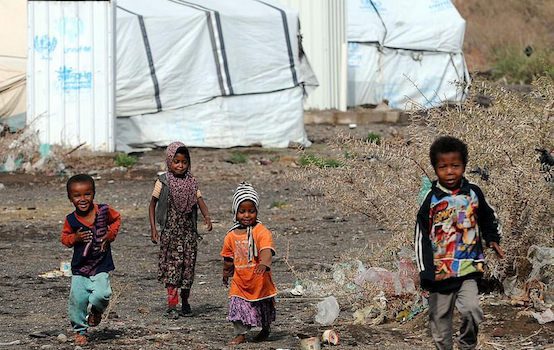The Man-Made Famine in Yemen

The U.N. and humanitarian organizations are sounding more alarms about the dire situation in Yemen, where millions are acutely malnourished and tens of thousands are already suffering famine-like conditions. The U.N.’s emergency relief coordinator Mark Lowcock said this:
Yemenis are being starved. That is the heart of it. And the statistics released last week are shocking. Amir [Deputy Executive Director of the World Food Programme] will speak to this.
It’s the war that’s pushing Yemen towards famine. That’s how we got to this point. The economy is collapsing as Nick (Dyer) said. And donors are offering much less help this year. Not western European or American donors but other key donors.
And so, what we’ve got now is the result of decisions taken by powerful people in Yemen and other countries. And that’s what I meant when I said that Yemen was being starved. Those same powerful people could just as easily choose not to starve Yemen.
Modern famines are the result of deliberate policy choices by governments and armed groups. The famine in Yemen is man-made. The Saudi coalition and our government have been some of the main authors of that famine. When Lowcock refers vaguely to “powerful people,” these are some of the people he is talking about. The U.S. suspended most of its aid to Yemen this year in a disastrous effort to use that aid as “leverage” against the Houthis, and now there is the danger that a U.S. terrorist designation will shut down humanitarian relief efforts entirely. The U.S. and other governments ought to be rushing additional aid into Yemen rather than choking it off, but that is not happening.
It is still possible to avert the worst-case scenarios and prevent the deaths of tens and possibly hundreds of thousands of people, but that requires at the very least ramping up humanitarian assistance, pressuring the Saudi coalition to halt its campaign, and refraining from any more destructive economic warfare. The U.S. bears significant responsibility for the catastrophe in Yemen, and it is within our government’s power to alleviate the humanitarian crisis or to worsen it drastically. The Trump administration has repeatedly chosen to make matters worse in Yemen, and it may do so once again before the end.
Designating the Houthis as a terrorist group is one measure that would be particularly disastrous for the people of Yemen. Eric Schwartz and Hardin Lang list a number of reasons why the designation shouldn’t happen, and this is their conclusion:
The litmus test for U.S. policy on Yemen is simple: does it help end the conflict, or keep alive the millions of suffering Yemenis? A terrorist designation of the Houthis fails on both counts. Sadly, the Trump administration knows this. In 2018, it decided against designating the Houthis because “it could complicate aid deliveries.” Yet despite worsening humanitarian indicators, President Trump has now decided to push forward.
Luckily, President-elect Biden and his team will shortly be in a position to roll back a designation. They should also unfreeze USAID funding for relief operations in Houthi-controlled territory, push Gulf countries to fund the UN humanitarian response, and re-energize the Yemeni peace process. The people of Yemen have endured enough. Ending their suffering should be a “day one” priority for the incoming Biden administration.
One of the main reasons why U.S. policy in Yemen has been so senseless and destructive is that our government insists on seeing Yemen through the distorting lens of the Iran obsession. The administration has shown no interest in helping to end the conflict. If they were interested in that, they would not have fought tooth and nail against the Congressional resolutions that demanded an end to U.S. involvement in the war. Instead they see the conflict in Yemen as an opportunity to oppose Iran. To that end, they have been satisfied to inflict enormous harm on tens of millions of innocent people because they happen to live under the rule of a group that has limited ties to Tehran. The Trump administration keeps failing the test on Yemen because it sees Yemen and Yemenis as expendable collateral damage in their effort to hurt Iran.
The war on Yemen has done nothing to hurt Iran in the slightest (not that it would be justified if it had), but it has driven a country of almost thirty million people into the abyss. For five and a half years, our government has supported the wrecking and starvation of another country, and we have failed to bring that horror to an end. That will have to change in the new year, or countless more Yemenis will die preventable deaths.
Comments